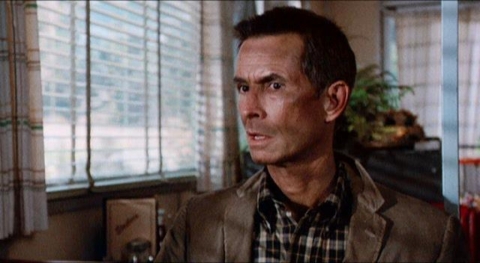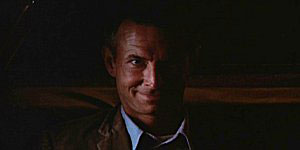Blog Archives
Psycho III (1986)
by Charles Beall
Psycho III was a mandatory sequel, much like all the Halloweens, Friday the 13ths, and Nightmare on Elm Streets of the mid- to late-1980s. However, mandatory does not equate to necessary and Psycho III (as well as its predecessor) does not escape this label. However, if we are going to have it, we might as well make it a good one and I believe that there was one person who had this belief: Anthony Perkins.
As I stated in my review yesterday, Psycho II wasn’t entirely a bad movie, per se, but an uneven one. So when the call to Tony Perkins came from Universal about the plans for another installment of Psycho, I believe he thought that it should be done right this time around. And who better to direct a film such as this than Norman Bates himself? The end result is actually a film that stands on its own (albeit in the shadow of the original) and I feel the credit is all due to the direction of Perkins.
What we have in Psycho III is an amateurish, yet brave film that attempts to stand above the crop of slasher sequels it is a member of. The film picks up about a month after the events in Psycho II, but even before we get into the mundane and quiet existence of Norman Bates, we are treated to an interesting prologue. In fact, Norman Bates doesn’t show up until about fifteen minutes into this 90-minute film. Over a black screen, we hear the words, “there is no God!” screamed out by a distressed nun named Maureen (Diana Scarwid). She is kicked out of the convent after a Vertigo-esque incident and hitchhikes with a guy named Duke (Jeff Fahey), with the two of them (via separate means) eventually ending up at the Bates Motel. Also thrown into the mix is a pesky reporter (a poorly-written part played too over-the-top by Roberta Maxwell) who is on to Norman and the suspicious occurrences that happened in Psycho II. Again, like its predecessor, Psycho III has a handful of main characters that drive the film’s story and underlying themes without being too overbearing.

Bitch, I'm taking Psycho to another dimension...the third dimension (as in making an attempt to make a decent movie, none of that gimmicky crap that involves a third movie in an unnecessary franchise being in 3D).
An interesting theme that is, I believe, the main drive of this film is the theme of redemption. Maureen is trying to redeem herself after the events at the beginning of the film and Norman is trying to redeem himself from everything he has become. They are both trapped in their lives, and much like the connection Norman had to Marion in the original, he has one with Maureen and what is unique about Psycho III is that it expands on the human connection we saw between Norman and Marion. Norman realizes this connection and tries oh-so-hard to develop it and break free, but, alas, someone is holding him back…
Yes there is gore because this is the mid-80s and a horror film is not allowed to not have it. Yet one may be surprised about how tame Psycho III is and how legitimate it tries to be as an exploration of the mind of Norman Bates. Those who are killed are not the main characters (at least in the run-up to the finale) but are rather filler for the demands of audiences who thirst for buckets of blood. Take out the murder scenes and what you have is, at its core, a psychological character study. As I stated earlier, Anthony Perkins is really the only one who knows Norman Bates, and much like his on-screen counterpart, it was hard for Perkins to break away from this typecast.
Psycho III is incredibly personal; Norman is wrestling with his identity and trying to break away from his past. However, he will always be Norman Bates. I believe Tony Perkins felt the same way and tried to convey his innermost feelings about playing Norman Bates through the character of Norman Bates. What comes to mind when you hear the name Anthony Perkins? Yep, Norman Bates. Both the actor and the character are trapped, for lack of a better term, with this persona and whatever they try to do, they can never break free.

Wait, so tell me this again. You're going to remake the original in twelve years and have Vince Vaughn fill my shoes? WTF, dude!
The ending to Psycho III, while at face value is corny, is actually quite tragic. Norman cannot break free of Mother. Anthony Perkins can’t break free of Norman Bates. Norman is humanized in this film to an extent that we have never seen a villain in film played before. There is a force that has taken hold of him, but he just isn’t strong enough to break away, and when you think he has, Mother just shows up again.
Psycho III is the best of the Psycho sequels for the sheer fact that it was directed by, essentially, Norman Bates. Perkins feels for the dilemma Bates is in he because he too is typecast in the real world as the psychopath. This unique aspect is what makes Psycho III work regardless of its flaws (and there are quite a few). On the surface, it is seen as just another horror sequel, but deep down, it is actually a moving film about trying to break free of the demons that haunt us and the redemption that so many aspire to receive, but ultimately fail to achieve. All of the credit goes to Anthony Perkins who, unfortunately, did not direct another film; he was a legitimate talent behind the camera and it is unfortunate that he was unable to direct again. However, I hope that viewers delve into Psycho III and sincerely listen to what Perkins is trying to say. One may see a slasher film, whereas I see an autobiographical piece of a character and the actor who plays him.
Grade: B+
Tomorrow, we milk the Psycho franchise even more with the made-for-TV film Psycho IV: The Beginning to find out what Mother was really like (she was actually kind of hot!)










